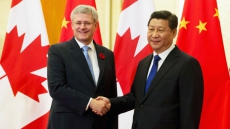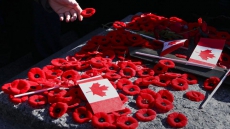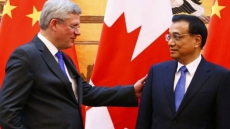WINNIPEG - It wasn't apparent at the time, but Manitoba Premier Greg Selinger started down the path to the internal NDP revolt that now threatens his political future on Easter Weekend in March 2013.
Selinger and then-finance minister Stan Struthers called up cabinet colleagues and told them the government was going to increase the provincial sales tax to eight per cent from seven in a budget that would be presented in the legislature in two weeks, according to a party source.
Selinger had specifically denied plans to raise the sales tax in the 2011 election, but with an ongoing deficit, slower-then-expected economic growth and new money needed to match a federal infrastructure program, the tax hike was suddenly front and centre.
At a cabinet meeting two days later, other revenue options were discussed, but the sales tax hike was pushed as almost a fait accompli, said the party source who would only speak to The Canadian Press on the condition of anonymity because they were not authorized to discuss the matter publicly.
"On every other revenue proposal, ministers had an opportunity to debate it. But (the sales tax hike) was going to happen."
The sales tax increase, and the NDP government's move to sidestep a referendum that was required under law on any major tax hike, caused the government to plummet in opinion polls. But in the months that followed, the NDP remained a tight unit, at least publicly.
That all changed two weeks ago when Struthers, who had been shuffled to the Municipal Government portfolio, and four other senior cabinet ministers broke ranks and publicly urged Selinger to consider resigning. They accused him of not listening to their concerns and of failing to rebuild public trust in the 18 months following the tax hike.
Struthers and the other rebel ministers — Erin Selby in Health, Theresa Oswald in Jobs and the Economy, Jennifer Howard in Finance and Andrew Swan in Justice — later resigned from cabinet, but remain in the NDP caucus and say they plan to run for re-election in 2016.
Selinger initially vowed to remain in place and run for re-election at the helm of the party. On Sunday, his staff confirmed Selinger has now agreed to a leadership contest at the NDP's annual convention next March, in which he will run again.
A political observer says the odds of Selinger surviving are long. Paul Thomas, a professor emeritus of political science at the University of Manitoba, said even if Selinger is re-elected with a slim majority, it may not be enough to quell the dissent.
"I think it has to be ... somewhere in the 60s (per cent) at least," Thomas said Sunday.
Some of the rebel ministers, most notably Struthers, have in recent days tried to distance themselves from the sales tax increase, saying it was imposed by Selinger. But the source said the cabinet meeting saw only some concerns expressed, not outright opposition.
"If (Struthers) was opposed to it, I never saw it.
"Could cabinet have stopped it? If there was a big protest, maybe. But there wasn't."
Howard, who was government house leader at the time, expressed worry about getting the tax bill through the legislature in the face of heated opposition that the Tories would put up, the source said.
Howard rejected interview requests on the subject. Struthers did not return messages seeking comment.
In the months that followed, Struthers, Howard and Oswald defended the tax hike at every turn, saying it was needed to protect front-line services and fund infrastructure projects. The government went on the offensive, saying the Opposition Tories' alternative to a tax hike would be deep spending cuts.
Oswald became a key promoter of the tax hike, touting it as a way create jobs in the construction industry while also fixing worn roads and bridges.
Howard openly praised Selinger's leadership last February. She told reporters that Selinger listened to his caucus and was not heavy-handed — a very different message than earlier this month when she accused Selinger of ignoring cabinet advice and focusing mostly on his own political survival.
Through the last 18 months, the government continued to languish in opinion polls, even after the government lauded its infrastructure agenda with a flurry of signs touting "Steady Growth, Good Jobs" at construction sites across the province.
Things came to a head at a caucus retreat in Brandon in September, the source said. Some caucus members had already quietly told Selinger he should step down to revive party fortunes.
He wouldn't budge and the dispute became open.
"Stan (Struthers) said 'I told you one-on-one what I think and now I need to say it here.'"
Others also called on Selinger to resign gracefully. Some were more direct than others. Selinger "sat there and listened. He was very respectful," but gave no indication he would consider quitting, the source said.
About half of the caucus supported Selinger at the September meeting, the source said, but the numbers may have changed since then.
With a majority in the legislature — 35 of the 57 seats — the NDP government is unlikely to fall. The rebel ministers have said they continue to be New Democrats and will not vote with the opposition parties.
But the turmoil surrounding Selinger will cause more damage to the party, Thomas said, even if he survives the March vote.
"Once you have these deep divisions, they are very, very difficult to repair. It's not going to happen overnight. It may take a loss in the next election," Thomas said.
"This has shaken the foundations of this party, I think."
The rift is the first one for the NDP since it took office in 1999. The turmoil facing Selinger stands in stark contrast to the continuous public and caucus support that his predecessor, Gary Doer, had for a decade in the premier's chair.
Doer did not have to deal with the economic slowdown that Selinger has faced but also had better political instincts, Thomas said.
"Selinger, I think, is first and foremost more philosophically left of centre and he's more of a policy wonk," Thomas said.
"(Doer) wouldn't have made the miscalculation, in political terms particularly, about the PST increase."






